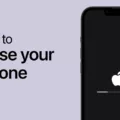Hacking has become a widespread problem in the digital world. It can have severe consequences, especially when it comes to mobile phones. In recent times, mobile phones have become a significant target for hackers. They can use various methods to gain access to your phone and steal your personal data, including contacts, passwords, and other sensitive information.
If you suspect that your phone has been hacked, it is essential to act quickly. The longer you wait, the more damage the hacker can do. Here are some steps you can take to fix a hacked phone:
1. Disconnect from the Internet
The first thing you should do is disconnect your phone from the internet. This will prevent the hacker from accessing your data and stop any further damage. You can do this by turning off your mobile data and Wi-Fi.
2. Remove Suspicious Apps
Hackers often use malicious apps to gain access to your phone. Check your phone for any suspicious apps that you don’t remember downloading. If you find any, remove them immediately.
3. Install Anti-Virus Software
Installing anti-virus software is an effective way to prevent hacking. Anti-virus software can detect and remove any malware or virus that may be present on your phone. Make sure to get the software from a trusted source and keep it updated.
4. Change Your Passwords
If your phone has been hacked, it is essential to change all your passwords immediately. This includes passwords for your email accounts, social media accounts, and any other accounts that may have been compromised.
5. Reset Your Phone
Resetting your phone is the last option you can choose if nothing seems to work. You can reset your phone by accessing the mobile setting and then choosing factory reset to erase all data. This will wipe out all the data stored on your device, such as photos, notes, and contacts, so it is important to back up this data before resetting your device.
If you suspect that your phone has been hacked, it is crucial to act quickly to prevent further damage. Disconnect your phone from the internet, remove any suspicious apps, install anti-virus software, change your passwords, and if nothing else works, reset your phone. Remember that prevention is always better than cure. Make sure to take necessary precautions such as using strong passwords, avoiding suspicious links, and keeping your phone updated to avoid being hacked in the first place.

Fixing a Hacked Phone
It is possible to fix a hacked phone, but it can be a complicated process depending on the severity of the hack. If your phone has been infected with malware or a virus, you can try to remove it by using a reputable antivirus app. However, if the hack is more severe and has compromised your phone’s system files, it may be necessary to reset your phone to its factory settings.
To fix a hacked phone, you should start by identifying the type of hack and the extent of the damage. If you suspect that your phone has been hacked, you should immediately disconnect it from the internet and any other devices to prevent further damage. You can then run a virus scan using an antivirus app or try to remove any suspicious apps or files manually.
If these methods do not work and the hack is causing significant problems with your phone’s performance or security, you may need to reset your phone to its factory settings. This will erase all of your data and apps, so it’s essential to back up any important information before proceeding. You can reset your phone by accessing the mobile settings and selecting the “factory reset” option.
Fixing a hacked phone is possible, but it may require a combination of antivirus scans and manual removal of suspicious files or apps. If the hack is severe, resetting your phone to its factory settings may be necessary. It’s important to take prompt action if you suspect that your phone has been hacked to prevent further damage or data loss.
Contacting Help If Your Phone Has Been Hacked
If you suspect that your phone has been hacked, there are a few key entities that you should contact immediately. Firstly, you should get in touch with your local FBI office, as they will have the resources and expertise to investigate any potential cybercrime. In addition to the FBI, you should also reach out to your cell phone provider as soon as possible. Your provider may be able to help you identify any unauthorized activity on your account or device, and may also be able to provide you with guidance on how to secure your phone and prevent future hacks. It’s important to act quickly in these situations, as hackers can cause significant damage if left unchecked. To summarize, if your phone is hacked, you should contact your local FBI office and your cell phone provider immediately.
The Consequences of Phone Hacking
When your phone is hacked, it means that an unauthorized person has gained access to your device without your knowledge or consent. This can lead to various consequences, including:
1. Data theft: The hacker can steal your personal information, such as bank account details, credit card numbers, and passwords.
2. Malware installation: The hacker can install malicious software on your phone, which can cause it to malfunction or even damage it permanently.
3. Unauthorized access to your phone’s features: The hacker can gain access to your phone’s camera, microphone, and other features, which can be used to spy on you.
4. Slow performance: If your phone is hacked, it might be running multiple malicious applications in the background, which can slow down its performance and drain its battery life.
5. Unexpected behavior: You might notice unexpected behavior on your phone, such as apps opening and closing on their own, or your phone sending messages or making calls without your knowledge.
6. Strange activity on your online accounts: A hacked phone can also lead to strange activity on your other online accounts, such as social media and email, as the hacker might have gained access to your login credentials.
It’s crucial to take immediate action if you suspect your phone has been hacked. This includes changing all your passwords, running a security scan on your device, and contacting your mobile provider or a cybersecurity professional for assistance.
Can Resetting a Phone Remove Hackers?
Resetting your phone can remove most malware or viruses that have infected your device, including those installed by hackers. This is because the reset process will erase all the data and apps on your phone, essentially restoring it to its original state when it was first purchased.
However, it’s important to note that resetting your phone may not necessarily remove all types of malware or hacking attempts. Some more sophisticated malware can embed themselves deep within your phone’s operating system, making them harder to detect and remove. In such cases, you may need to seek professional help to fully remove the malware or hack from your device.
It’s also worth mentioning that resetting your phone will erase all your personal data, such as photos, contacts, and messages. Therefore, it’s important to back up this data before resetting your device. You can usually do this by syncing your phone with your computer or cloud storage account.
Resetting your phone can be an effective way to remove most types of malware or hacking attempts, but it’s not a guaranteed solution. It’s always best to take preventative measures, such as regularly updating your phone’s operating system and apps and avoiding suspicious downloads or websites, to minimize the risk of getting hacked in the first place.
Conclusion
Hacking has become a prevalent issue in our digital age, with cybercriminals constantly finding new ways to infiltrate devices and steal personal information. It is important for individuals to take proactive measures to protect their devices from being hacked, such as regularly updating software, using strong passwords, and avoiding suspicious links and downloads. However, if a device has already been hacked, it is crucial to take immediate action, such as resetting the device, contacting authorities, and monitoring other online accounts. By staying informed and taking precautionary steps, we can help prevent hacking and ensure the safety of our personal information.








